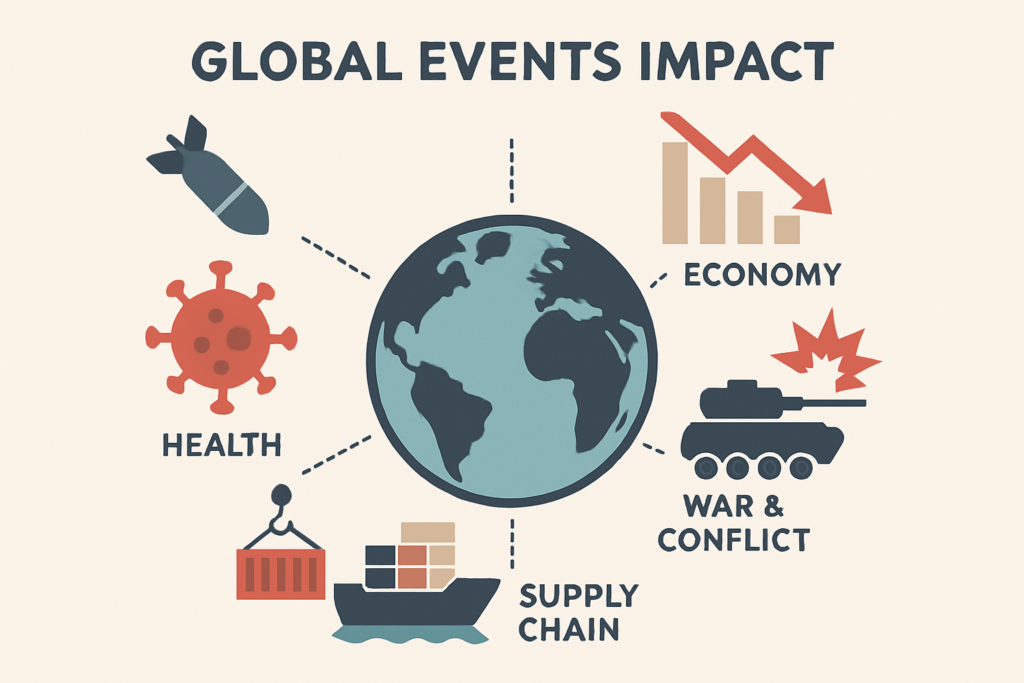How Technology is Transforming Business Practices Today
How Technology is Transforming Business Practices Today
Forget everything you know about “business as usual.” Technology in business isn’t a futuristic fantasy—it’s happening now, reshaping the landscape faster than most can keep up. Walk into any competitive industry and you’ll find automation humming in the background, digital tools connecting teams across the world, and data driving decisions with ruthless efficiency.
This transformation touches every corner, from startups hustling out of garages to global powerhouses with decades of legacy to defend. The pace isn’t slowing. Faster internet, smarter software, and more accessible cloud platforms are making it easier—and cheaper—to overhaul old ways of working. If you’re not keeping an eye on technology in business, you’re just watching competitors speed past.
The bottom line? Embracing tech isn’t optional anymore. Companies that cling to analog processes or ignore digital trends risk more than just FOMO; they risk extinction. Staying relevant means understanding that tech is no longer a department. It’s the heartbeat of the entire operation.
The New Normal: Tech in Business
Let’s get one thing straight—technology in business is not a passing trend, it’s the new baseline. No more talking about digital as something on the “to do” list. Whether you run a factory, a coffee shop, or a consulting firm, tech is woven right into your day-to-day. Digital tools are how orders get placed, how your team chats, how your brand shows up to customers.
The pace? It’s relentless. Every major industry is riding this wave of digital transformation. Grocery stores use algorithms to stock shelves. Hotels run their bookings and reviews online. Even local gyms use apps for memberships and scheduling. If you’re still trying to run things on pen and paper, you’re not just behind—you’re invisible.
This isn’t about fancy gadgets for the sake of it. It’s the standard for getting things done. Fast. Efficient. Competitive. Technology in business is now the cost of staying in the game. Ignore the shift, and you’ll get left behind—fast. Adapt, and you start playing to win.
What Happens After Winning Millions?
Winning a life-changing lottery jackpot is every player’s dream, but few are prepared for what comes next. The sudden influx of wealth can bring excitement, but also a wave of challenges. Here’s what typically follows a big win:
The Financial Reality of Winning
Many winners face critical financial decisions almost immediately:
- Taxes and Legal Issues: A large chunk of the winnings often goes to taxes, and failing to plan can lead to legal troubles.
- Investing vs. Spending: Some winners hire financial advisors to ensure long-term security, while others spend impulsively without a plan.
- Budgeting for the Future: Without proper money management, even the biggest jackpots can disappear quickly.
Lifestyle Overhaul
Sudden wealth can transform lifestyles dramatically:
- Luxury Purchases: Mansions, sports cars, and extravagant vacations become instantly affordable.
- Social Pressure: Long-lost friends and distant relatives often reappear, expecting a share of the winnings.
- Privacy Challenges: Some winners struggle with unwanted media attention and public scrutiny.
While some embrace their new wealth openly, others choose to live discreetly to avoid pressure and expectations.
Giving Back and Creating a Legacy
For some, wealth is not just about personal luxury—it’s an opportunity to make a difference. Many winners choose to:
- Donate to charities and community projects
- Fund scholarships or support education initiatives
- Invest in businesses that create jobs and opportunities
Some lottery winners go from players to philanthropists, proving that wealth can be used to leave a lasting impact. Unfortunately, not all stories end positively—many who fail to manage their winnings properly find themselves bankrupt within years.
What Happens After Winning Millions?
Winning a life-changing lottery jackpot is every player’s dream, but few are prepared for what comes next. The sudden influx of wealth can bring excitement, but also a wave of challenges. Many winners find themselves overwhelmed by financial decisions, from managing taxes to making smart investments. Some handle it well, while others struggle with reckless spending that drains their fortune faster than expected.
The Financial Reality of Winning
Many winners face critical financial decisions almost immediately:
- Taxes and Legal Issues: A significant portion of the winnings often goes to taxes, and failing to plan can lead to legal troubles.
- Investing vs. Spending: Some winners hire financial advisors to ensure long-term security, while others spend impulsively without a plan.
- Budgeting for the Future: Without proper money management, even the biggest jackpots can disappear quickly.
A Lifestyle Overhaul
A sudden fortune changes life in more ways than one:
- Luxury Purchases: Mansions, sports cars, and extravagant vacations become instantly affordable.
- Social Pressure: Long-lost friends and distant relatives often reappear, expecting a share of the winnings.
- Privacy Challenges: Some winners struggle with unwanted media attention and public scrutiny.
While some winners embrace their new wealth openly, others choose to live discreetly to avoid pressure and expectations.
Giving Back and Creating a Legacy
For some, wealth is not just about personal luxury—it’s an opportunity to make a difference. Many winners choose to:
- Donate to Charities and Community Projects: Many create scholarships or support education initiatives.
- Invest in Businesses: By investing, winners can create jobs and opportunities.
Some lottery winners transition from players to philanthropists, proving that wealth can be used to leave a lasting impact. However, not all stories end positively—many who fail to manage their winnings properly find themselves bankrupt within years.
Top Trends Shaping 2025
Let’s get real: 2025 is coming fast, and tech in business is not slowing down. If anything, the pace is only getting more relentless. Here’s what’s dominating the future.
First off, artificial intelligence and machine learning are shifting from trendy buzzwords to must-have tools. Businesses aren’t just automating the boring stuff—they’re using AI to predict what customers want, track inventory before it becomes a problem, and even flag risks in real time. Basically, digital transformation is going deep into decision-making, not just the surface-level stuff.
Cybersecurity isn’t an afterthought anymore. It’s now built into every layer of a company’s process, not just walled off in the IT department. Companies know that one leak or breach can ruin trust. So, investing in smarter security—not just more of it—is set to be a defining trend.
Sustainability isn’t going away, either. The tech that powers business is getting greener. Tools to track and report a company’s carbon footprint are becoming about as standard as balance sheets. Regulators and customers both expect it, and technology in business is how you deliver real results, not just nice-sounding promises.
On the customer front, new digital platforms are finding fresh ways to bridge the gap between brands and buyers. Think AI-powered chatbots that don’t sound like robots, augmented reality previews before you buy, and marketing automation that actually feels personal.
Bottom line: these trends are more than fads—they’re signals that digital transformation isn’t a choice, it’s a reality. Business leaders who keep their eyes up and their tech nimble will have a serious edge. Those who don’t? Well, they’ll feel outdated before they know it.
How to Keep Up With Business Tech Changes
It’s easy to feel like you’re drowning in updates and shiny new tools. But staying competitive with technology in business isn’t about chasing every trend—it’s about making smart, intentional moves. First, invest in regular training for yourself and your team. A workforce that knows how to use the latest tech will always move faster and smarter. Second, agility is king. Don’t hardwire your operations to yesterday’s solutions; look for systems that scale as you grow and pivot. Finally, carve out time in your week to scan reliable news sources. Not sure where to start? Bookmark the top business headlines and skim them on Monday mornings. Adapt fast, plan smart, and don’t let the pace intimidate you—just keep moving forward.
Challenges on the Road to Digital Transformation
Let’s not sugarcoat it—rolling out new tech isn’t all smooth sailing. For every business that seamlessly goes digital, a dozen more hit snags: budget overruns, staff who’d rather stick with what they know, and old systems that just won’t play nice with the new ones. The truth is, change costs money and time, and leaders have to choose: invest now or pay for it later in lost opportunities.
People are another wild card. Sure, some team members can’t wait to try the latest app or workflow update, but plenty see “digital transformation” as code for more headaches. If you don’t have buy-in from every level—especially the folks who’ll actually use the tools—you’re setting yourself up for missed deadlines, botched launches, and dollars down the drain.
It’s not just about plugging in fresh software—successful digital transformation needs vision and guts from leadership. When execs treat tech as a box-ticking exercise rather than a real chance to evolve, the result is half-baked projects that never deliver. So, if you’re gearing up for massive change, it pays to have clear goals, honest communication, and a willingness to course-correct. Otherwise, tech in business becomes just another failed initiative, instead of the game changer it’s supposed to be.
Looking Ahead: The Future of Technology in Business
Here’s the tough truth: the pace of change isn’t slowing down. If anything, technology in business is about to get even more relentless. Expect more automation working behind the scenes—AI that doesn’t just help with routine tasks, but actually learns and adapts to your workflow. Businesses tapping into this won’t just save time; they’ll make faster, smarter decisions with less second-guessing.
It’s not enough to drop cash on the latest software. The winners will be the people and teams willing to learn, test, fail, and pivot. That looks like building a culture where it’s normal to try out a new tool or rethink big-picture strategy every quarter, not just when you’re forced to. The future belongs to those who take action, not just keep up.
Bottom line: relentless change is the new normal, and keeping ahead means ditching the comfort zone. Experiment, learn, repeat. That’s how you don’t just survive, but lead.
More Inspiration and Insights
If you’re hungry for more, don’t stop here. There’s a ton of valuable content just a click away—seriously, you can lose hours (the good kind) exploring how top companies mix tech and business. Not sure where to start? Hit up Forbes on Technology & Business Transformation. Their coverage cuts across industries, so whether you run a small shop or a big enterprise, you’ll find fresh strategies, honest case studies, and expert takes on what’s next. Staying plugged in isn’t just smart—it’s necessary.
Conclusion: Winning Means Staying Adaptable
Here’s the bottom line: technology in business isn’t just about shiny new tools or big IT projects—it’s a way of thinking. The businesses that win are the ones that don’t flinch when change hits. They look for the upside, move fast when needed, and never get too comfortable. If you want your business to stay ahead, keep learning, keep experimenting, and don’t be afraid to ditch outdated habits. The future won’t wait. Adapt, and you’ll stay in the game. Refuse to change, and you’ll watch from the sidelines.















































































































































































































































































































